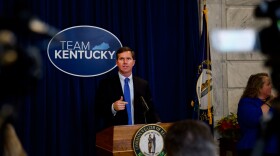A committee of Kentucky lawmakers gathered Monday to start finalizing a two-year state budget, which they predict will be changed significantly due to a drop in tax revenue resulting from the coronavirus pandemic.
Legislators are still meeting during the coronavirus outbreak even though the State Capitol campus is closed to the general public and despite warnings about group gatherings spreading the disease.
Senate President Robert Stivers, a Republican from Manchester, said that budget writers are trying to get a revised revenue estimate before they begin writing the final version of the spending plan.
“Those revenues will not be the same or even close to the same that they were projected,” Stivers said. “We know we are going to go into a downturn in our economy.”
The Republican-led legislature announced they would take a week off from the full legislative session last Thursday, though the state budget conference committee will continue to meet this week.
The full House and Senate are scheduled to reconvene on Thursday at 2:00 pm, possibly to consider a final version of the budget.
State revenues were already predicted to be lackluster over the next two years, according to the official estimate set in December by the Consensus Forecasting Group, a nonpartisan group of economists.
But now as large swaths of Kentucky and the nation’s economy shut down in response to coronavirus, the amount of money the state brings in is sure to be significantly less—altering how budget writers look at the next two fiscal years, and possibly leading to a shortfall in the current one.
House Speaker David Osborne, a Republican from Prospect, said that the times are challenging.
“They will require us to be creative, and in some cases require us to be reactive. I don’t think that’s always the best way to make policy, but I think certain times demand that,” Osborne said.
Kentucky’s fiscal year ends on June 30. If at year-end, tax revenues are 5 percent or less than predicted, the governor is required to rebalance the budget or tap Kentucky’s rainy day fund. If revenue is greater than 5 percent less, the legislature is required to come back into session to work on the budget.
Senate Minority Leader Morgan McGarvey, a Democrat from Louisville, said that lawmakers are dealing with the budget under “very unique circumstances".
“We need to take the necessary steps in preparing for the fallout of a global pandemic. However drastic the shortfalls may be, we must ensure that the health, safety, and education of Kentuckians are the top priorities,” McGarvey wrote in a statement.
Republican leaders of the legislature have been racing to try to pass a budget and other bills as the disease continues to spread across the state and country.
On Thursday, the Senate passed its version of the budget, which would withhold $1.1 billion from the teacher pension system unless structural changes like a change in benefits are made.
The legislature also gave final passage to a voter ID law, a Republican priority that has drawn outcry from some election experts.
Democratic Gov. Andy Beshear has called on lawmakers to focus on the budget and adjourn the session quickly. Beshear has the power to call lawmakers back for a special legislative session, but has said he would only do so for them to consider the budget and coronavirus-related measures.
The current schedule for the legislature is to meet on March 26 and April 1 to pass more bills. Beshear then has a period to consider vetoing or signing bills. Lawmakers then hope to return for two final days on April 14 and 15, the last day they are allowed to meet under the state constitution.





